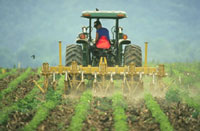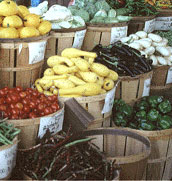Dear Umbra,
Does one really need to wash produce off the shelf or out of the bag? I’ve been eating vegetables as they are for years. Does it really do any good to wash them? If they are contaminated internally, then washing the outside won’t help, will it?
Jane
Steubenville, Ohio
Dearest Jane,
Please wash your veggies. Internal contamination from pesticides, herbicides, waxes, and the wages of sin won’t be washed away, but some life-threatening external contamination will.

You’ll want to wash these greens.
Trust us.
Photo: USDA
Think about your produce. It may have traveled from Mexico, China, California, or Chile. It was picked, cleaned, cut, and packed by a giant diesel machine or tired humans. It was shipped hundreds if not thousands of miles, in close proximity with other, unknown, commodities. It was unloaded from the truck, unpacked from the box, and placed on the display, where it sat for a few hours or days as hundreds of people walked by, leaning over it, breathing on it, and touching it. Who knows how many other hands have fondled your broccoli, or how many germy miasmas have wafted past each floret. Given our current food-distribution matrix, it’s a miracle that so few health disasters happen.
Witness Pennsylvania, which just had the largest outbreak of food-borne hepatitis A in the history of the United States. More than 500 people fell ill from this potentially deadly virus in an outbreak that has been traced to green onions grown in Mexico. Hep A, like other yucky food-borne illnesses such as E coli and campylobacter, has a fecal-oral transmission route. (Do I need to spell it out?) The feces in question can be from animal compost, tainted water, or human hands. Hand-washing is vital at every stage of food production, transport, and consumption. Washing produce in the kitchen is also an important factor in reducing the possibility of food-borne illness. It won’t prevent Hep A, but it can cut down on the risk of E coli and campylobacter. Even if you circumvent the food-distribution matrix and buy local, you should wash your food. I, for one, feel extra-motivated to scrub my farm-fresh local produce, which often carries the pesticide-free seal in the form of slugs.

Turning the vegetables.
Photo: USDA
This need to treat your baby carrots as a potential disease vector may seem like more of a health concern than an environmental issue. It does have very clear environmental connections, however. As I mentioned above, food-safety hazards are harder to control and trace in a global food system. Although the U.S. has high environmental and food-handling standards, our food is often grown far from inspectors and fines, not to mention clean water. The system by which food is grown and shipped to the U.S. is in itself an environmental (and social) disaster. Its ill effects include fossil-fuel consumption, pesticide contamination of workers and water, loss of species diversity, destruction of wilderness lands, devastation of farming communities, the creation of a large mobile population turned out from their traditional land-based occupations, and on and on.
Yes, I’ve led us right back to the importance of supporting local agriculture. So let me just sum up today’s advice: There’s simply nothing better to put in your imported stainless steel lunchbox than local food. You’ll still need to wash the veggies, but your environmental conscience will already be cleaner.
Sluggishly,
Umbra


